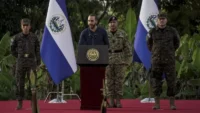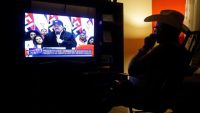
Latin America Likes Bukele’s ‘War on Gangs.’ That’s a Problem
Back in October, the mother of Karla Raquel Garcia stood with other protesting parents outside the juvenile detention center in Ilopango, El Salvador, waving $300 in the air as she tearfully demanded information on the whereabouts of her daughter. Sixteen-year-old Karla had been arrested for no clear reason in June and reportedly lost the baby she was carrying due to a beating at the hands of the arresting officers. Since then, Karla’s mother has not had any news about her daughter’s whereabouts and condition.
“I trusted you, mister president”, Karla’s mother shouted. “You gave us $300. I’ll hand them back to you, mister president.… Seguir leyendo »




